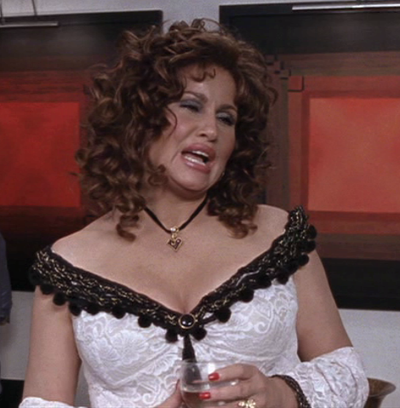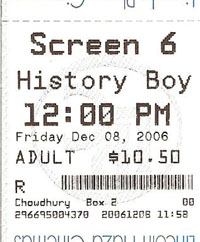Little Children, Todd Field's adaptation of Tom Perrotta's novel (with
help from the novelist), steeps its tale of suburbia in a dream-like calm. What
might at first appear to be straightforward, naturalistic moviemaking is
actually extremely artful. The vernacular settings conceal this somewhat, but
the exquisite timing gives it away. Everything about this movie has been worked
on until it is just right, and its faintly self-conscious assurance makes it
almost frightening.
Like Alexander Payne's Election (another Perrotta title), Little
Children is about a nice-looking town where things are not so nice - because
they're human. Mr Perrotta is an artist of the small moral weakness, and he is
seismically attuned to the stress of ennui that's unavoidable in any environment
primarily designed to accommodate children. The little children of the title are
not the central characters but the forces of gravity that bind the adults in
place. Sexuality is scrubbed until it's almost something to which a child might
be exposed, however fleetingly. Sexual deviance is the number-one horror.
There are two deviants in Little Children. One is a convicted felon,
Ronnie McGorvey (Jackie Earle Haley), whose presence in the town alarms parents.
In one electrically tense scene, Ronnie shows up at the town pool, and paddles
about underwater with flippers and a scuba mask, checking out the kiddies'
bottoms until the mother's recognize him and the police are summoned. Mr Field
communicates first the man's prurience and then his disorientation, as if he has
been unjustly accused of something. The film (which treats Ronnie somewhat more
sympathetically than the novel) suggests that, indeed, this might be so, as we
come to sympathize with him and his "mommie" (Phyllis Somerville) when their
house is besieged by Larry Hedges (Noah Emmerich), a troubled former cop. In his
obsessive hounding of Ronnie, Larry is a bit of a deviant, too, although not in
a sexual way.
The other sexual deviant is Sarah Pierce (Kate Winslet). A former graduate
student who can't quite believe that she has sunk to suburban life as the wife
of a successful branding executive (Gregg Edelmann) and mother of three year-old
Lucy (Sadie Goldstein). Sarah lives in a distracted haze until her senses focus
on Brad Adamson (Patrick Wilson), a stay-at-home Dad - he's supposed to be
studying for his third bar exam - whom the other moms in the playground call
"The Prom King." One of them puts Sarah up to trying to extract a phone number
from Brad, but once she and Brad are talking, Sarah has a better idea: she
invites him to kiss her. This he very graciously does, sending the moms
scurrying off with the children and marking Sarah as a pariah.
You might argue that, as it takes two to tango, Brad is just as deviant, but
of course society does not regard men as deviants simply because they tumble
into bed with attractive, willing women. (Sarah is not supposed to be very
attractive, but Ms Winslet does what she can to comply.) Brad's infidelity to
his wife, Kathy (Jennifer Connelly), is dwarfed by his infidelity to the career
that she has marked out for him. His nickname is all too apt: a former football
star, he has somehow passed the stage of life when the joys of youth are
claimable. His affair with Sarah is not a mature liaison but an attempt to
reconnect with carefree adolescence, where all the consequences are distant. In
the course of the story, Brad takes up football again, and, more recklessly,
tries a few skateboard moves.
Sarah's passion for Brad, however, is very mature. Hers is a very fully
awakened sensuality. This comes out in every sort of scene. At one point she
accompanies a friend to a reading discussion group. The book of the week is
Madame Bovary. Mary Ann (Mary B McCann), the leader of the playground moms
and the only other young woman in the group, dismisses Flaubert's novel as the
tale of a stupid slut. The other women try to introduce more nuanced views, but
Mary Ann's morality of control works only in black and white. Finally, Sarah's
sponsor turns to her. As Sarah defends the novel, her face begins to glow, and
you know that talking about Emma's adulterous relationship with Rodolphe is
making her feel the heat of her own with Brad. By the end, she is serenity
itself - just as stupidly sure of a future with her lover as Emma - and Mary
Ann's philistine comments no longer reach her. It is a love scene manqué.
(The book club scene would be a great place to begin the study of Mr Field's
thoughtful filmmaking. He is very generous to the elderly ladies, and sensitive
to the gradations of their empowerment as women. They coo appreciatively at
Sarah, and you sense that she, and not the strident Mary Ann, would be welcome
in the future. Behind all of this is a sharper, subtler point: these women are
no longer charged with rearing little children. They get to be fully adult.)
Ronnie's story, such as it is, does really not intersect with Sarah's story
until the end of the movie, but it suffices to charge hers with dread and
isolation. There is an earlier, indirect contact, when the Pierces and the
Adamsons get together for dinner, Sarah is deeply surprised to discover that
Brad has met Ronnie - and not told her. As she exclaims, "You never told me!',
Kathy's face, although quite out of focus in the background, visibly darks - and
then the focus shifts, and you know that Kathy knows.
My advice, therefore, is to save Little Children for a time when you
are both quiet and alert. It's too intelligent to be dozed through.


